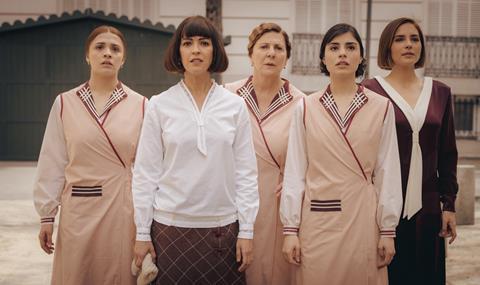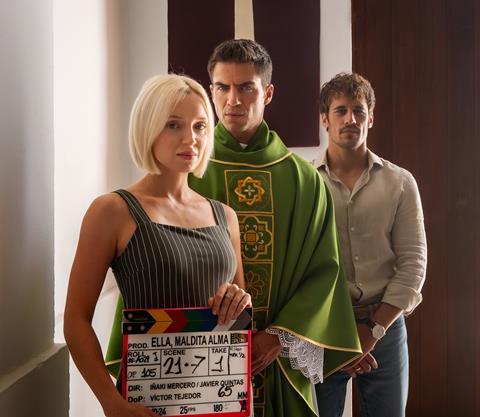Ahead of Conecta Fiction in Cuenca next week, Broadcast International explores the Spanish giant’s renewed scripted strategy
Mediaset España is getting back into fiction, betting again on locally produced primetime series that can run on flagship channel Telecinco, with one eye on the international market.
It was September 2021 when Telecinco lost the throne as the most watched free-to-air channel in Spain after almost three years.
One year later, owner MediaForEurope (MFE) announced the end of the tenure of Mediaset España’s chief exec Paolo Vasile. The Roman executive left the company in January 2023 after 23 years and was replaced by Alessandro Salem, former content director at Rete Televisive Italiane (RTI).

Exec reshuffles did not stop there and in early 2025, there was another twist: Manuel Villanueva, head of content for more than 20 years, was replaced by Alberto Carullo, previously vice president of Max’s local original productions for Italy and Iberia.
And while Telecinco retained its big reality shows such as Supervivientes (Survivor), La Isla de las Tentaciones (Temptation Island) and Gran Hermano (Big Brother) as the main pillars of its schedule, the company is now also upping its investment in scripted.
“We will launch three series per year so that we can really look after them. Our aim is to produce just a few titles, but to ensure they are very well-tailored and with big promotional campaigns,” Ghislain Barrois, head of cinema, fiction, rights and distribution at Mediaset España, tells Broadcast International.
“With around 70 Spanish series being launched each year, plus all the foreign productions, you really need to create an event around every production. If not, it will go unnoticed.”
Embracing the favourites
The first title that emerged from this renewed scripted strategy was period drama La Favorita 1922, which also marked the first collaboration between Bambú Producciones - the company behind Netflix hit Cable Girls - and Telecinco.
Pre-sold to over 20 territories, including the US, Lat Am, Canada and many eastern European territories, the series premiered in March with a promising 17.1% share and 1.5 million viewers.
“We promoted the series as if it was a film: red carpet premiere in the centre of Madrid, a lot of outdoor advertising…,” adds Barrois, and although linear ratings went down, Telecinco is airing the two seasons commissioned without a rest. Barrois says he is “very satisfied with its performance.”
Among the series set to be launched are Detective Romi (8 x 70 minutes) and La Agencia, the Spanish adaptation of Mediawan’s Call My Agent.

Detective Romi is from Producciones Mandarina and tells the chronicles of Romi, a 30-year-old private detective with an innate gift for investigation: she is deaf. The series has been created by a group of emerging talents who studied showrunning on a course set up by Mediaset España and Catalonian film school ESCAC.
On the Call My Agent remake, Barrois describes the adaptation as “a big challenge”, because the broadcaster kept its own 70-minute episode length rather than adapting to the 30-minute long episodes of the original show.
“Executive producer Daniel Écija and his team have done a great job deepening on the plots and the emotions of the characters,” Barrois adds, highlighting that La Agencia has “some Spanish actors known worldwide thanks to the streamers such as Jaime Lorente or Jose Coronado, and that means we have a strong argument to sell the series abroad.”
And this is important, because Mediaset España’s distribution arm, Mediterráneo, is handling worldwide rights of the Spanish adaptation, providing another opportunity to recoup production costs.
Cost-driven partnerships
Barrois admits production costs are rising and says it is pushing the company into more contemporary financing models, particularly with global streamers.
“High production costs make us work with trusted prodcos and we need streaming platforms as a partner,” adds Barrois, who last October during the South International Series Festival in Cádiz, Spain, highlighted that his company’s alliance with Prime Video had enabled it to renew long-running comedy La Que Se Avecina for two more seasons.
“This series created by Laura and Alberto Caballero [Netflix’s Alpha Males] will reach 17 seasons. I think, nowadays, that is a miracle, a huge achievement,” he says.
It is by no means the first example of Telecinco’s partnerships with the streamers however, with Entrevías acquired by Netflix and offered worldwide under the title of Wrong Side of The Tracks. It aired its fourth and final season last October, while more recently La Favorita 1922 has also been acquired by the streamer.

On Barrois’ upcoming slate, shows include Ella, Maldita Alma, produced by Plano Plano and pitched as a contemporary version of the classic UK drama, The Thorn Birds. The series shot its eight episodes in Cádiz, Andalusia, while Telecinco’s next series to launch - Marusía: Vientos de Honor - is set in the opposite side of the country, Galicia.
The story of this Unicorn Content production happens in a military school, described by Barrois as “an unseen scenario for a story in a Spanish drama,” and explores both an investigation into a mysterious death and a love story.
The last project announced by Telecinco is Pura Sangre, a family drama produced by Shine Iberia (Banijay Iberia) with “very good people and very bad people surrounded by thoroughbred horses, enormous trees and big houses,” Barrois says.
Common threads
While varied in subject matter, the three upcoming projects - Ella, Maldita Alma, Marusía: Vientos de Honor and Pura Sangre - do share some common attributes.
All are female-skewing, reflecting the fact that women spend most time watching TV in Spain, especially those older than 45 years of age.

And while Mediaset España is prioritising its own developments, the group is not closed to international co-production, especially with sister Mediaset Italia and Germany’s ProsiebenSat.1, in which MFE owns a stake.
“We have regular meetings with both of them to explore potential fiction co-productions,” Barrois says, adding that previous experiences in international co-production “have been positive”.
He added that the focus is currently on “developing our own projects in order to keep total creative control and to make sure that the final result fits our needs,” but as evidenced by series such as Entrevías, the broader global demand for Spanish drama looks set to offer further opportunities to Barrois and his team.








No comments yet